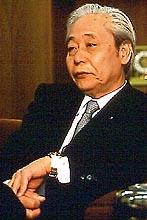
When the atom bomb fell on Nagasaki on 8 August 1945, Ryuzaburo Kaku, then a 19-year-old conscripted shipyard worker, who had studied nuclear physics, knew immediately what had happened. Contrary to orders, he urged his colleagues to stay underground for three days to shelter from the fallout, so saving their lives.
Kaku rose to become president, chairman and chief executive of the Japanese cameras-to-copiers multinational Canon. Few business leaders have matched Kaku’s vision in advocating a global ethic for business in an era of globalization. Businesses, he insisted, needed “a guiding philosophy for the 21st century". Much of his conviction grew from his war experience.
He advocated kyosei (literally “symbiosis”) as a basis for corporate responsibility, interpreting it as “living and working together for the common good of mankind”. Corporations, he said, needed to look to the interests of all stake-holders — employees, shareholders, customers, suppliers and the wider community
He insisted, however, that big business should also tackle “global imbalances” - in trade relations, employment, the gap between rich and poor nations, and in “the quality of the environment that today’s generation leaves for the next”. Kaku projected his own company in this vein and expected other business leaders to follow suit.
With Kaku at the helm, Canon underwent a world-wide expansion during the last two decades of the 20th century, opening 18 factories outside Japan. Good pragmatic business sense, no doubt, in face of the soaring yen of the 1980s, which impelled Japanese companies to transfer production overseas. In so doing, Canon saw its sales increase by up to 20 per cent a year, contributing to Japan’s now almost forgotten economic boom.
The company which has sold over 80 million cameras, became the world’s largest producer of photocopiers and the second largest maker of printers. But Kaku insisted that the common good should also be served, by offsetting Japan’s trade surplus, of which he was a surprisingly harsh critic, and by creating jobs, especially in developing Asian economies such as China.
When it came to the environment, Kaku was particularly concerned about the legacy being left to future generations. His traumatic experience at Nagasaki gave him his passionate concern for ecological issues, incorporated into Canon’s environmental practice, where his kyosei philosophy was most manifest. A special department employs 300 people to look at ways of minimizing damage to the ecosystem, from manufacturing to disposal. “Of all the great problems which confront the global community,” he said, “perhaps the greatest is that of imbalance between the generations: between those of us who live on the earth today and those who will inhabit it in the future.”
The driving force behind kyosei was a man who had a mind of his own. Ryuzaburo Kaku joined Canon in 1955 when it was an up-and-coming camera manufacturer. He gained a reputation for being a thorn in the flesh of top management, bombarding them with suggestions and rarely satisfied with the answers. He was appointed president in 1997, after the company was unable to pay a dividend following the 1974 oil-price hike. He was chairman and chief executive from 1989 until his retirement in March 1999.
Kaku’s advocacy of kyosei was welcomed by the Keidanren (Federation of Economic Organisations) which included it in its charter of good corporate conduct. Kyosei, he said, would mean “a decisive turn away from a Japan committed to making only itself rich, towards a focus on the quality of life”. Abroad, he was a founder member the Swiss-based Caux Round Table (CRT) forum of American, European and Japanese business executives. CRT incorporated kyosei into its Principles for Business, a highly regarded statement of best practice, published in 1994.
Kaku’s call for business responsibility towards future generations seemed entirely appropriate, coming from the chairman of a company called Canon. In Japanese it is the name for the Buddhist Goddess of Mercy.
Ryuzaburo Kaku, businessman: born Aichi Prefecture 19 May 1926; president, Canon 1977-89, chairman and chief executive 1989-99; married 1957 Meiko Morita (one son, one daughter); died Tokyo 26 June 2001.
First published in The Independent, UK, 10 July 2001
